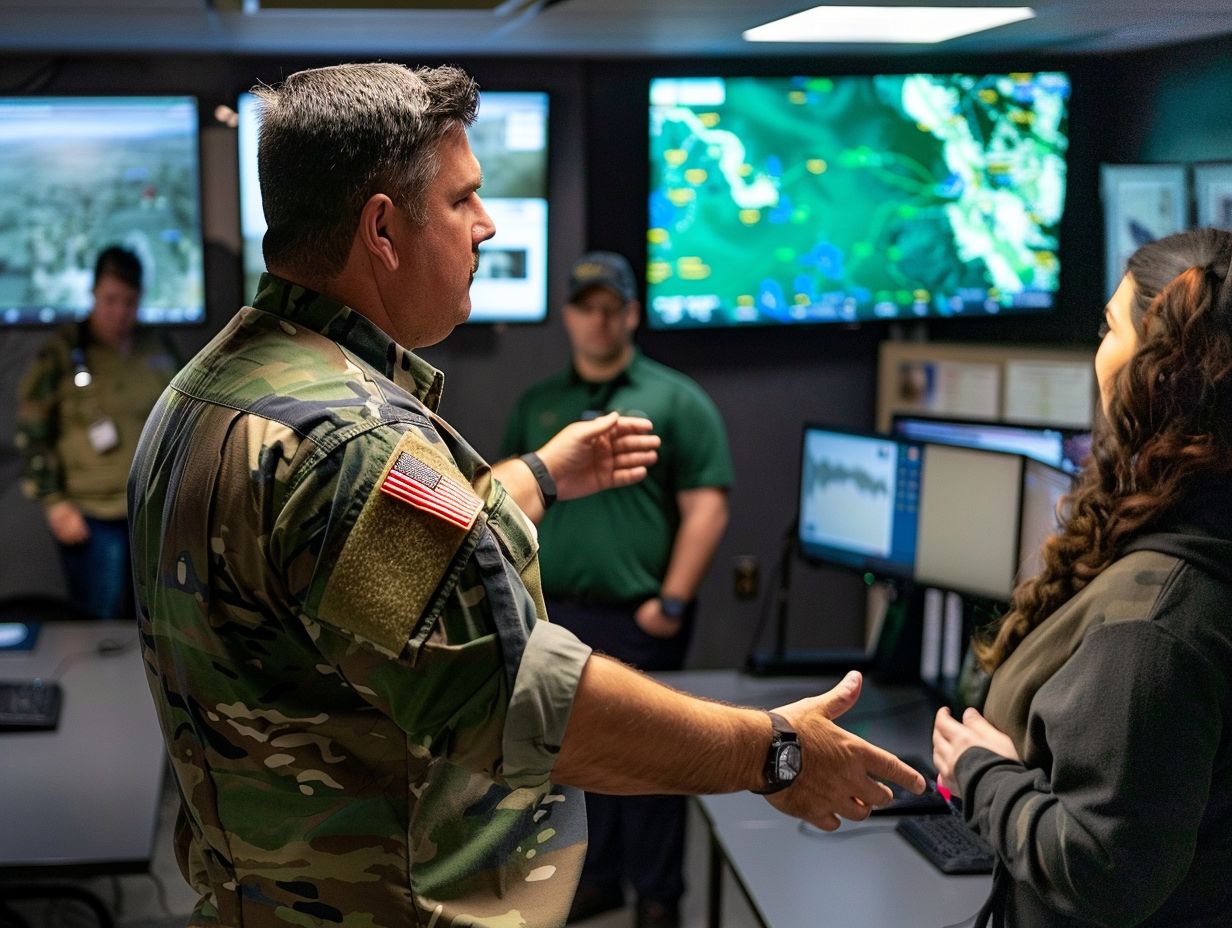If you are considering a career in cybersecurity, have you been introduced to the position of a Certified Incident Handler?
This exploration will delve into the duties of a CIH and the advantages of acquiring EC Council’s certification. From enriching your expertise and understanding to readying yourself for crisis management, crucial concepts and tactics for managing cybersecurity incidents will be discussed.
Be prepared for practical applications of CIH certification through the examination of case studies and testimonies of success.
Key Takeaways:

The Role of a Certified Incident Handler
In the world of cybersecurity, a Certified Incident Handler plays a critical role in protecting organizations from cyber threats and ensuring a prompt and efficient response in the face of security incidents. You, as a Certified Incident Handler, are tasked with the management and mitigation of various cyber incidents, ranging from malware attacks to network security breaches. Your responsibilities involve adhering to established defense frameworks and incident management protocols.
Your role includes identifying the nature and origin of the incident, evaluating the potential impact on the organization’s systems and data, and implementing response strategies to contain and eliminate the threat. When dealing with malware attacks, your expertise is focused on analyzing the malicious code, understanding its behavior, and eliminating it from the affected systems. Similarly, in the case of network breaches, you concentrate on identifying vulnerabilities, restoring network integrity, and instituting preventive measures to avert future breaches.
Understanding the Responsibilities
In your role as a Certified Incident Handler, it is crucial to proactively identify and assess potential cybersecurity threats and attack vectors that could pose a risk to your organization’s security posture. Your responsibilities include developing and implementing robust defense frameworks, incident management policies, and response procedures to effectively handle cyber incidents.
Continuous monitoring of network traffic, logs, and systems is necessary to detect any anomalies or suspicious activities that may indicate a security threat. Conducting thorough incident analysis is also part of your duties, helping you understand the nature and scope of the breach, as well as the impact on sensitive data and critical systems. Your role is pivotal in devising response strategies that focus on containing incidents promptly, minimizing damage, and restoring normal operations.
It is imperative to ensure compliance with relevant laws and regulations, in addition to maintaining proper documentation. This is essential for conducting accurate forensic investigations and preparing compliance reports.
Benefits of EC Council’s Certified Incident Handler Certification
Obtaining EC Council’s Certified Incident Handler (E|CIH) certification offers you, as a professional in the cybersecurity field, a valuable opportunity to enhance your skills and knowledge in incident handling and response. This certification equips you with the necessary tools and expertise to effectively manage cyber incidents and protect organizations from evolving threats.
The E|CIH certification not only sharpens your incident handling capabilities but also significantly boosts your cyber threat awareness. Through E|CIH training, you gain in-depth knowledge and practical experience that enable you to identify, analyze, and respond to cybersecurity incidents efficiently. The certification serves as a testament to your proficiency in cybersecurity incident management, providing validation of your skills and expertise to potential employers and clients. Acquiring the E|CIH certification is a strategic investment in your career, opening up opportunities for advancement and ensuring a strong foundation in handling cyber threats.
Enhancing Skills and Knowledge

The EC Council’s Certified Incident Handler certification program is designed to enhance your skills and knowledge in cybersecurity incident management. This program offers a comprehensive curriculum and hands-on labs to provide you with a deep understanding of cyber threat intelligence, incident response methodology, and defense strategies.
The training modules included in the E|CIH certification cover a broad range of topics, such as malware analysis, network forensics, and risk assessment. Practical exercises are incorporated to help you apply theoretical knowledge to real-world scenarios, allowing you to simulate cyber incidents and develop your incident handling capabilities effectively. This hands-on approach will equip you with the necessary skills to identify and mitigate security threats efficiently.
By emphasizing the significance of threat intelligence, security systems, and risk assessment, this certification program ensures that you will be well-prepared to respond promptly and effectively to cybersecurity incidents.
Preparing for Crisis Management
Effective crisis management in cybersecurity requires meticulous preparation, strategic planning, and proactive measures to prevent and mitigate potential threats. Certified Incident Handlers play a critical role in developing and implementing incident response plans, conducting risk assessments, and ensuring organizational readiness to tackle cyber incidents.
These experts are responsible for analyzing vulnerabilities, identifying potential points of exploitation, and implementing measures to strengthen the system’s defenses.
Incident preparation involves identifying key stakeholders, establishing communication protocols, and creating a response team trained to handle various types of cyber threats.
Containment strategies focus on isolating the affected systems, limiting the spread of the incident, and preserving critical data integrity.
Recovery processes include restoring systems to normal operations, conducting post-incident analysis to improve future response capabilities, and updating incident response plans based on lessons learned.
Key Concepts and Strategies
In crisis management, understanding key concepts and strategies is essential for effective incident response. As a Certified Incident Handler, you must grasp fundamental cybersecurity principles, incident analysis techniques, and response strategies to address diverse cyber incidents and safeguard organizational assets.
Regarding incident analysis, it plays a crucial role in the early detection and containment of cybersecurity threats. By conducting thorough forensic analysis, professionals like yourself can uncover the root cause of incidents and develop targeted response plans. Incorporating threat intelligence allows organizations to stay ahead of evolving threats, leveraging real-time data to bolster defense frameworks.
Effective containment strategies are vital for you to limit the impact of security breaches and prevent further escalation. By integrating these elements into your incident handling approach, organizations can enhance their overall cyber resilience and mitigate risks effectively.
Handling Cybersecurity Incidents
When navigating cybersecurity incidents, you need to adopt a systematic and methodical approach to incident response. Certified Incident Handlers adhere to a structured process that involves detection, analysis, containment, eradication, recovery, and post-incident review in order to effectively manage and mitigate cyber threats.
Upon detecting anomalies or potential breaches in your system, you should promptly move into the analysis phase. Here, you will conduct thorough investigations to comprehend the nature and scope of the incident. This critical step entails forensic analysis to collect evidence, identify vulnerabilities, and ascertain the extent of the compromise.
Once the analysis phase is complete, your focus should shift to implementing containment measures. These measures are crucial for preventing the further spread of the threat and minimizing damage to your organization’s systems and data.
Step-by-Step Incident Response Process

In cybersecurity, the incident response process follows a structured methodology to effectively address and mitigate cyber incidents. Certified Incident Handlers employ a step-by-step approach, beginning with incident detection and containment and progressing to recovery and forensic analysis. This ensures a comprehensive and thorough response to security breaches.
Detection methods are essential for identifying potential threats, which may involve using intrusion detection systems, network monitoring, and security information and event management tools.
Once an incident is detected, containment strategies are put in place to prevent the spread of the threat, such as isolating affected systems and shutting down compromised services.
Eradication procedures focus on eliminating the root cause of the incident from the environment, thereby securing systems against similar attacks in the future.
Recovery steps include restoring systems to normal operation, implementing backups, and verifying system integrity.
Post-incident analysis is crucial for assessing the effectiveness of the response, extracting lessons from the incident, and enhancing security measures for future incidents.
Real-World Applications of CIH Certification
The CIH certification from EC-Council provides cybersecurity professionals like yourself with practical skills and knowledge that have real-world applications across various industries and organizations. Through case studies and success stories, you can see how Certified Incident Handlers effectively respond to cyber incidents, mitigate risks, and safeguard critical assets.
For example, consider a recent data breach incident at a multinational financial services firm. A team of CIH-certified professionals swiftly analyzed the attack vectors and contained the intrusion, preventing unauthorized access to sensitive customer information. This proactive response not only minimized potential financial losses but also upheld the company’s reputation for security and trustworthiness within the market.
Similarly, a pharmaceutical company was able to evade a ransomware attack by utilizing the expertise gained through CIH certification to identify and neutralize the threat before it could disrupt operations or compromise intellectual property.
Case Studies and Success Stories
Examining case studies and success stories of Certified Incident Handlers can provide you with valuable insights into the practical application of cybersecurity skills and knowledge. These real-world examples demonstrate how professionals effectively respond to cyber incidents, conduct forensic analysis, and implement mitigation strategies to protect organizations.
When you delve into specific instances where EC-Council’s Certified Incident Handler: Incident Response Lifecycle have played a significant role, you can see how their prompt actions and expertise have helped prevent data breaches and reduce the impact of cyber threats. For example, in a recent incident at a financial institution, a Certified Incident Handler swiftly identified a malware attack, contained the breach, and restored systems within hours, thereby preventing substantial financial loss.
These success stories highlight the importance of employing trained professionals who can utilize threat intelligence, perform vulnerability assessments, and implement proactive measures to strengthen cybersecurity defenses.
Frequently Asked Questions
What is EC Council’s Certified Incident Handler?

EC Council’s Certified Incident Handler (ECIH) is a certification program designed to prepare individuals for handling and responding to various cyber security incidents.
What skills does ECIH focus on?
ECIH focuses on developing skills in detecting, responding, and mitigating incidents by providing training and hands-on experience with various tools and techniques.
How does ECIH prepare you for crisis situations?
ECIH covers topics such as incident handling process, forensics, and vulnerability management, which are essential for handling and responding to crisis situations in a timely and effective manner.
Who can benefit from ECIH certification?
ECIH is beneficial for IT and cyber security professionals, incident handlers, risk assessment professionals, and anyone involved in incident response and management.
Is ECIH recognized globally?
Yes, ECIH is recognized globally as a credible and valuable certification for individuals involved in incident response and handling.
Can ECIH be used for career advancement?
Yes, ECIH can help individuals enhance their skills and knowledge in incident handling and management, making them more valuable and competitive in the job market.
